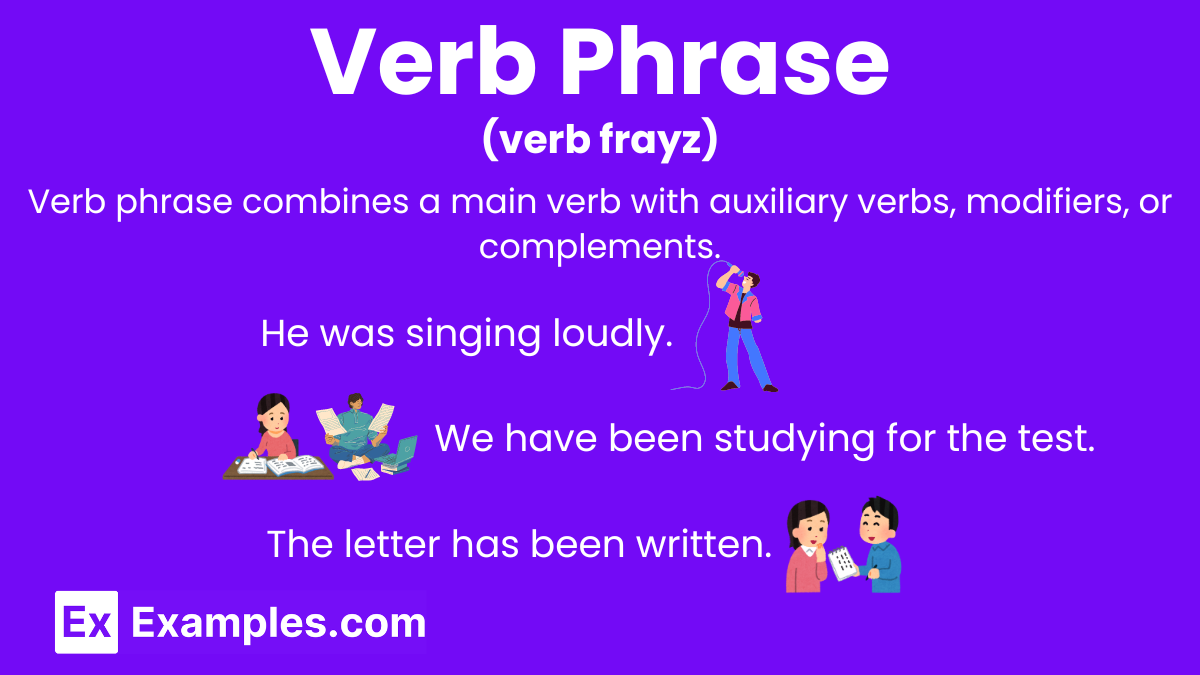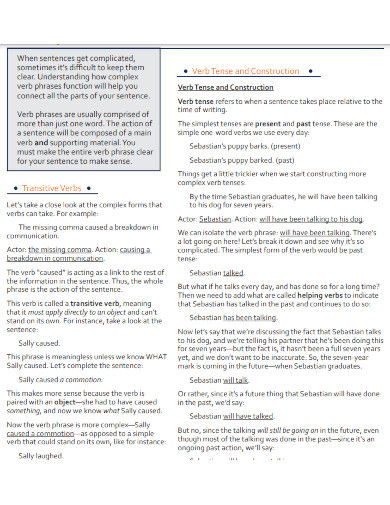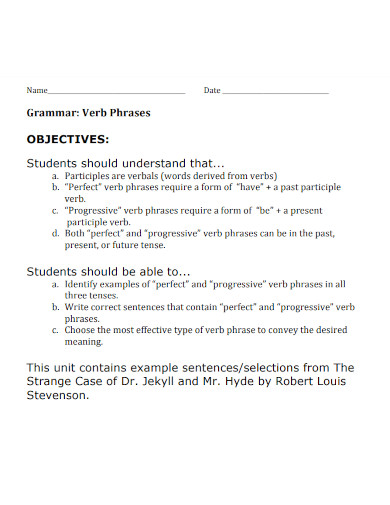70+ Verb Phrase Examples
A verb phrase is a fundamental component of English grammar that consists of a main verb and its auxiliaries or modifiers. It functions as the action or state of being in a sentence, conveying what the subject is doing or experiencing. Verb phrases can include auxiliary verbs like “have,” “do,” and “be,” which help to form different tenses, moods, and voices. Understanding verb phrases is essential for mastering English, as they are crucial for constructing clear and effective sentences.
What is a Verb Phrase?
Types of Verb Phrase
1. Simple Verb Phrase
A simple verb phrase consists of a main verb only. It shows the action or state of being. For example, in “She runs,” “runs” is the simple verb phrase.
2. Perfect Verb Phrase
A perfect verb phrase includes a form of “have” as an auxiliary verb and the past participle of the main verb. It indicates completed actions. For example, “She has finished her homework.”
3. Progressive Verb Phrase
A progressive verb phrase uses a form of “be” as an auxiliary verb and the present participle of the main verb. It shows ongoing actions. For example, “She is running.”
4. Perfect Progressive Verb Phrase
A perfect progressive verb phrase combines forms of “have” and “be” with the present participle of the main verb. It indicates actions that were ongoing but are now completed. For example, “She has been studying.”
5. Passive Verb Phrase
A passive verb phrase uses a form of “be” as an auxiliary verb and the past participle of the main verb. It emphasizes the action done to the subject rather than the subject performing the action. For example, “The cake was eaten by the children.”
6. Modal Verb Phrase
A modal verb phrase includes a modal verb (can, could, will, would, shall, should, may, might, must) and the base form of the main verb. It expresses necessity, possibility, permission, or ability. For example, “She can swim.”
List of Verb Phrase Examples
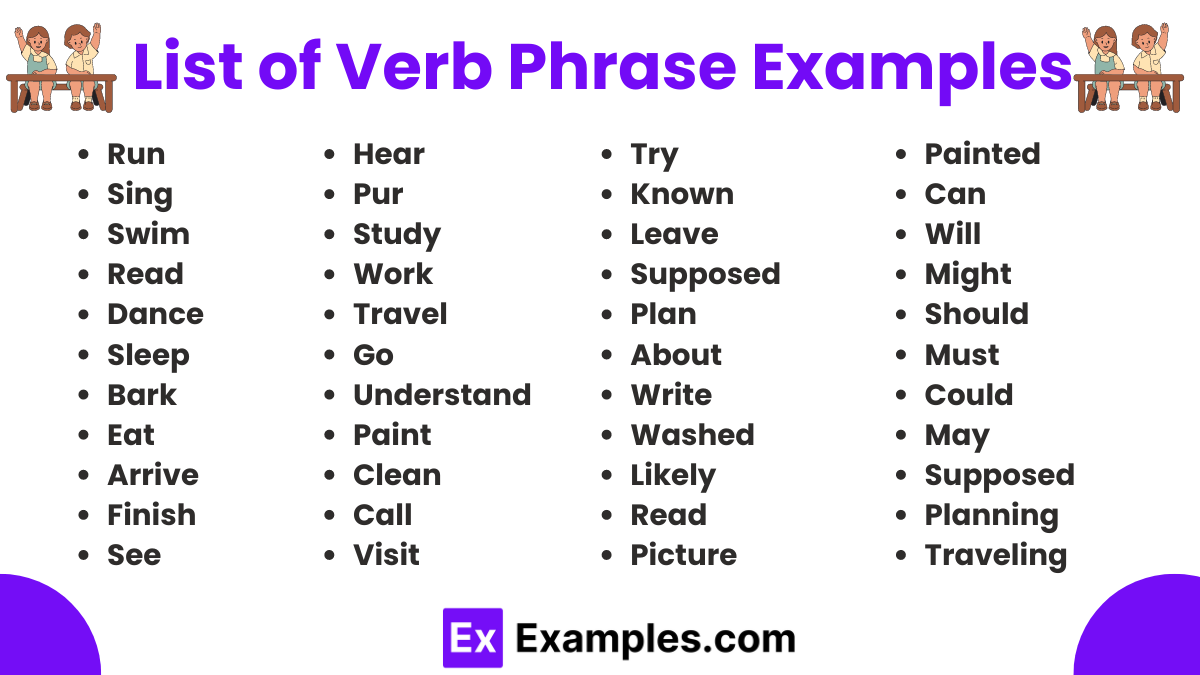
| Run | Sing | Swim | Read | Dance |
| Sleep | Bark | Eat | Arrive | Finish |
| See | Hear | Pur | Study | Work |
| Travel | Go | Understand | Paint | Clean |
| Call | Visit | Try | Known | Leave |
| Supposed | Plan | About | Write | Washed |
| Likely | Picture | Painted | Can | Will |
| Might | Should | Must | Could | May |
| Planning | Traveling | Working | Finished | Dancing |
| Barking | Purring | Reading | Trying |
Examples of Verb Phrase in a Sentences
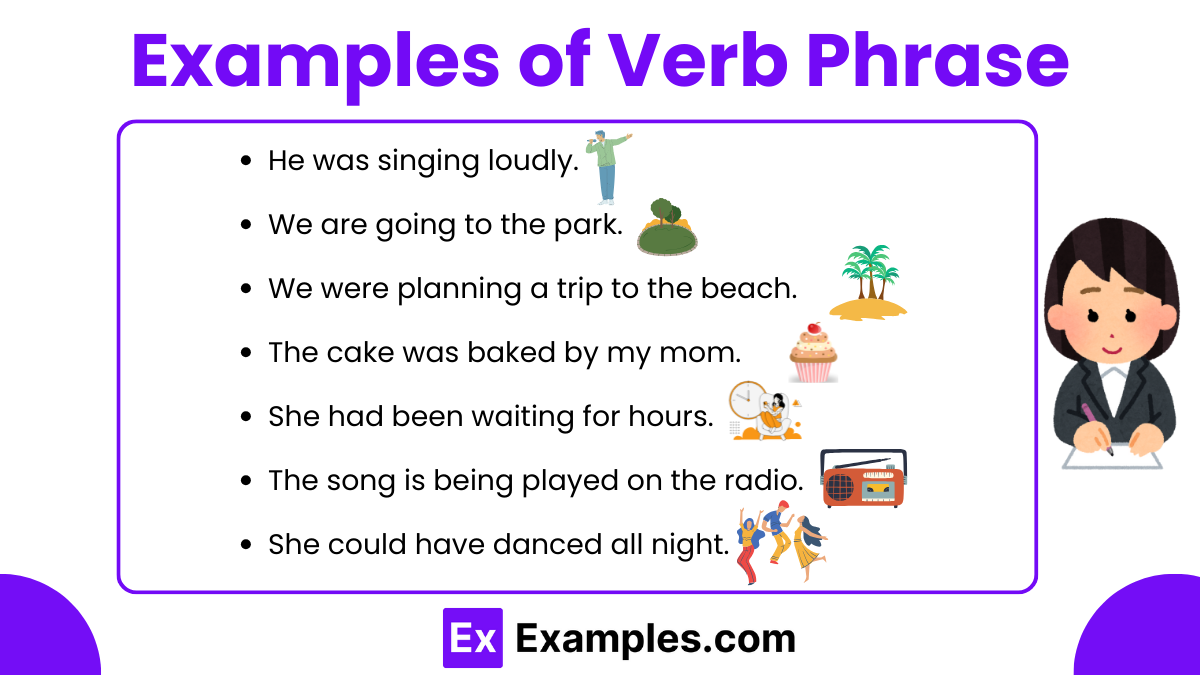
- She is reading a book. They have finished their homework.
- He was singing loudly.
- We are going to the park.
- I have seen that movie.
- The dog is barking at the mailman.
- The cat has been sleeping all day.
- She can swim very fast.
- They should arrive soon.
- He might join us later.
- We were planning a trip to the beach.
- I will help you with that.
- The cake was baked by my mom.
- The letter has been written.
- She had been waiting for hours.
- They are talking about the new project.
- He is running in the marathon.
- We have been studying for the test.
- I am trying to understand the problem.
- The house was cleaned yesterday.
- The song is being played on the radio.
- She could have danced all night.
1. Verb Conjugation Chart
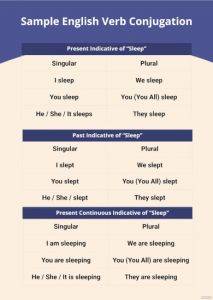
2. Complex Verb Phrases
3. Verb Phrases Objectives
Difference Between a Verb Phrase and Verbal Phrase
| Aspect | Verb Phrase | Verbal Phrase |
|---|---|---|
| Definition | Contains a main verb and its auxiliaries, modifiers, or complements. | A phrase that includes a verb form but does not function as the main verb of a clause. |
| Function in a Sentence | Acts as the predicate, showing action or state of being. | Functions as a noun, adjective, or adverb, not as the main verb. |
| Examples | “She is running,” “They have finished.” | “Running late,” “To finish quickly,” “Baked by the sun.” |
| Components | Must include at least one main verb and can include auxiliary verbs. | Includes verbals (gerunds, infinitives, participles) but no auxiliary verbs. |
| Usage | Directly relates to the subject’s action or state. | Modifies or adds information to the main verb, noun, or another part of the sentence. |
Functions of Verb Phrase
- Express Actions: Verb phrases show what the subject is doing.
- Indicate States of Being: Verb phrases describe the condition or existence of the subject.
- Show Tense: Verb phrases indicate when an action takes place (past, present, future).
- Form Questions: Verb phrases help in asking questions.
- Create Negatives: Verb phrases help in forming negative statements.
- Indicate Possibility or Ability: Verb phrases express what is possible or what someone can do.
- Provide Additional Information: Verb phrases give more details about how, when, or where an action occurs.
- Form Passive Voice: Verb phrases shift focus from the doer to the action.
How to Use Verb Phrase
Verb phrases are essential for constructing clear and precise sentences. They help in expressing actions, states, and additional details about the subject.
Demonstrate Actions
Utilize a verb phrase to depict what the subject is doing.
Describe Conditions
Use a verb phrase to explain the subject’s condition or existence.
Convey Tense
Employ a verb phrase to show the timing of an action (past, present, future).
Ask Questions
Formulate questions using a verb phrase
Make Negative Statements
Create negatives with verb phrases
Express Capability or Permission
Use verb phrases to indicate what someone can do or is allowed to do.
Add Specific Details
Provide extra details about actions using verb phrases
Create Passive Constructions
Use verb phrases to form passive sentences, emphasizing the action over the doer
Tips for Using Verb Phrase
- Choose the Right Tense: Match the verb phrase with the correct time frame.
- Be Clear and Concise: Avoid unnecessary words within the verb phrase.
- Use Modals Appropriately: Employ modals to express necessity, ability, permission, or possibility.
- Form Negative Statements Correctly: Place “not” correctly within the verb phrase.
- Ask Questions Properly: Invert the subject and auxiliary verb to form questions.
- Emphasize with Passive Voice: Focus on the action rather than the doer using passive constructions.
- Use Progressive Forms for Ongoing Actions: Combine “to be” with a present participle to show ongoing actions.
- Combine Auxiliaries for Specific Meanings: Use multiple auxiliaries to convey precise meanings.
- Add Adverbs for Detail: Include adverbs within verb phrases for additional context.
- Practice Consistency: Maintain consistent verb phrases to avoid confusion.
What is a Verb Phrase Example?
A verb phrase includes a main verb and its auxiliaries, modifiers, or complements, such as “is running” or “has finished.”
How Do You Identify a Verb Phrase?
Identify a verb phrase by locating the main verb and any accompanying auxiliary verbs, modifiers, or complements in a sentence.
Is Could Be a Verb Phrase?
Yes, “could be” is a verb phrase combining the modal verb “could” with the main verb “be.”
Can a Verb Phrase Be a Clause?
Yes, a verb phrase can function as the predicate in a clause, providing action or state information about the subject.
What Is Another Name for a Verb Phrase?
Another name for a verb phrase is a “compound verb,” especially when it includes auxiliary verbs.
Can a Verb Phrase Be an Adjective?
No, a verb phrase functions as a verb, not as an adjective, though it can describe or modify nouns.
Can a Verb Phrase Have a Preposition?
Yes, a verb phrase can include a prepositional phrase to provide additional context, such as “running in the park.”
How to Identify Verb Phrases?
To identify verb phrases, look for the main verb and any auxiliary verbs, modifiers, or complements within the sentence.
How to Pronounce Verb Phrase?
Pronounce “verb phrase” as /vɜːrb freɪz/, stressing the first syllable of “verb.”
Is Pick You Up a Verb Phrase?
Yes, “pick you up” is a verb phrase consisting of the main verb “pick” and the particle “up,” along with the object “you



